Florida Leads Higher Education Revival With Innovative Tuition Opportunity for Distance Learning
Key Findings
- Florida is a national leader in high-quality, low-cost higher education.
- State lawmakers recently passed an innovative policy creating an online, out-of-state tuition rate at select colleges that allows Florida’s high-caliber education to reach students nationwide.
- Florida will benefit as it reinforces its higher education legacy.
Overview
Florida has done it again. In 2024, state lawmakers bucked the systematic norms by passing legislation to create a new tuition rate for out-of-state students at select colleges.1
Specifically, three Florida Colleges—Miami Dade College, Polk State College, and Tallahassee Community College, which will become Tallahassee State College on July 1—may now charge a new, lower tuition rate, including distance learning fees, to non-resident, distance learning students.2 The new rate of $290 per credit hour, or roughly $7,000 per year, would apply beginning with the 2024-2025 academic year.3
With this new law, Florida reinforces its legacy as an innovative leader in higher education.
Florida is a national leader in high-quality, low-cost higher education.
Florida leads the way in offering students a high-caliber education. State leaders accomplish this by consistently weeding out divisive and politically charged initiatives.
Deceptively named diversity, equity, and inclusion (DEI) efforts have seen a sharp rise in recent years.4 Radical leftists are attempting to take over higher education. While many colleges and universities are bastions of political indoctrination, Florida institutions focus on educating.5
Last year, Florida prohibited institutions of higher education from spending taxpayer dollars on discriminatory initiatives like DEI.6 The state also prohibited programs and courses grounded in theories that systemic racism and oppression are inherent to our nation’s institutions.7 Moreover, the state ended the use of political filters for admissions and hiring in the public university system.8
More recently, Florida’s Board of Governors—the governing body for the state’s university system—voted to prohibit state universities from using state or federal funds to support DEI programming.9 Florida’s leadership in these efforts has even prompted the University of Florida to be referred to as “the Harvard of the Unwoke.”10

The DEI industry is valued at more than $9 billion annually.11 While other schools incentivize anything but meritocracy, costing taxpayers millions, Florida is focused on excellence.12 Florida uses performance-based funding, which applies important metrics to measure success: percent of graduates employed, median wages of graduates, average cost to the student, graduation rates, etc.13 This is imperative as test scores nationally are at their lowest levels in decades.14 Unsurprisingly, Florida’s higher education system has held the top spot nationwide for seven consecutive years.15
While DEI efforts at public institutions are costing taxpayers millions and likely helping to drive up tuition, Florida keeps tuition rates at the nation’s lowest levels for its residents.16 Most students nationwide graduate with debt.17 Individuals spend their entire lives paying off student loans.18
But in Florida, in the 2020-2021 academic year, 75 percent of Florida’s resident undergraduate students did not take out any loans.19 The Florida College System specifically holds tuition low.20 Contrast this with nationwide tuition trends, where prices have risen.21 Florida students are also graduating at high rates, ranking second for completing two-year degree programs and fourth in the nation for four-year graduation rates.22
That Florida is the state spearheading this innovative solution to bring affordable options to students nationwide should not be surprising. The new online out-of-state tuition reform originates in Florida’s college system where graduates already took on less debt by graduation than the national average by nearly $5,000.23
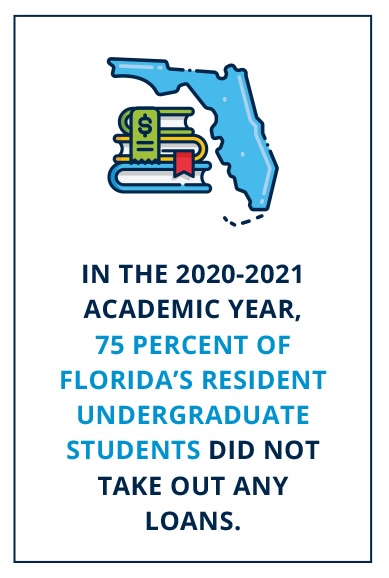
Public tuition rates are set annually by the Florida legislature.24 This is also true for the Florida College System, with additional local and institutional fees set by college-specific trustees and the Florida Board of Governors.25 Because of state leadership and dedication, Florida boasts the lowest in-state tuition in the country.26
While the Biden administration peddles free college shams, Florida’s newest reform encourages excellence and self-sufficiency.27
State lawmakers passed an innovative policy creating an online, out-of-state tuition rate at select colleges that allows Florida’s high-caliber education to reach students nationwide.
Florida’s colleges are a springboard for students, with 65 percent of the state’s high school graduates choosing to begin their higher education at a Florida college.28

With Florida’s new law, the state’s high-quality, low-cost education could reach even more students nationwide. Housed within the Florida College System, this new out-of-state online tuition rate is poised to meet a growing demand for online colleges.29
Florida’s policy authorizes three select colleges to charge a new, out-of-state tuition rate, including distance learning fees, for online students.30 This new rate is set at $290 per credit hour or roughly $7,000 per year for 24 credit hours.31
For low-income students who are Pell Grant eligible, the cost of online tuition would now be less than the maximum 2024-2025 Pell Grant award of $7,395, ensuring a Florida degree comes at no cost to students and even allowing leftover funds for textbooks.32
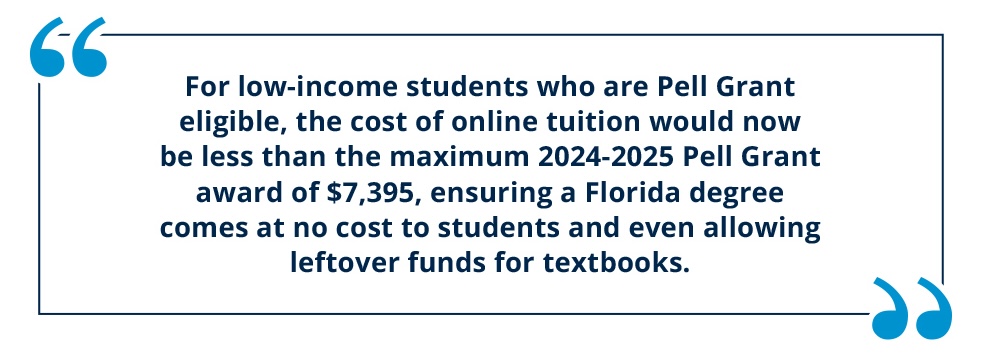
The new online tuition rate for out-of-state students will apply to three Florida colleges: Miami Dade College, Polk State College, and Tallahassee Community College.33 While the new tuition rate would provide cost savings to out-of-state students, it is still well above the tuition rate for Florida residents.
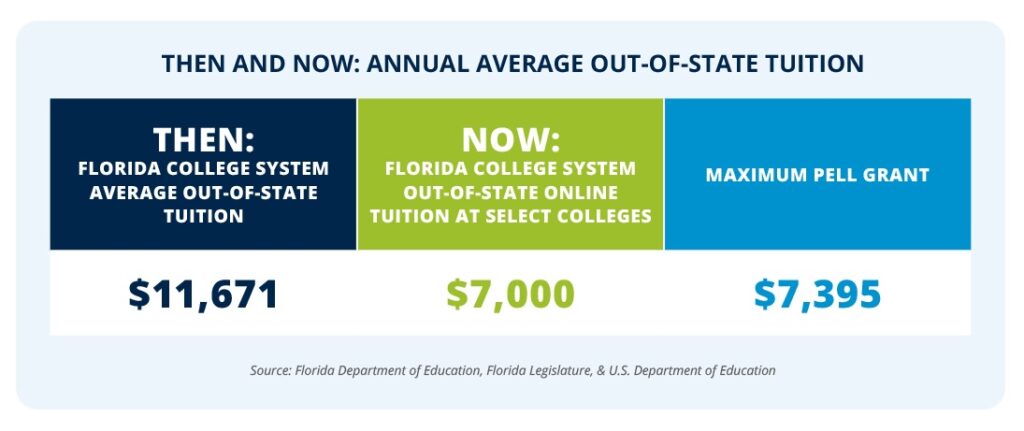
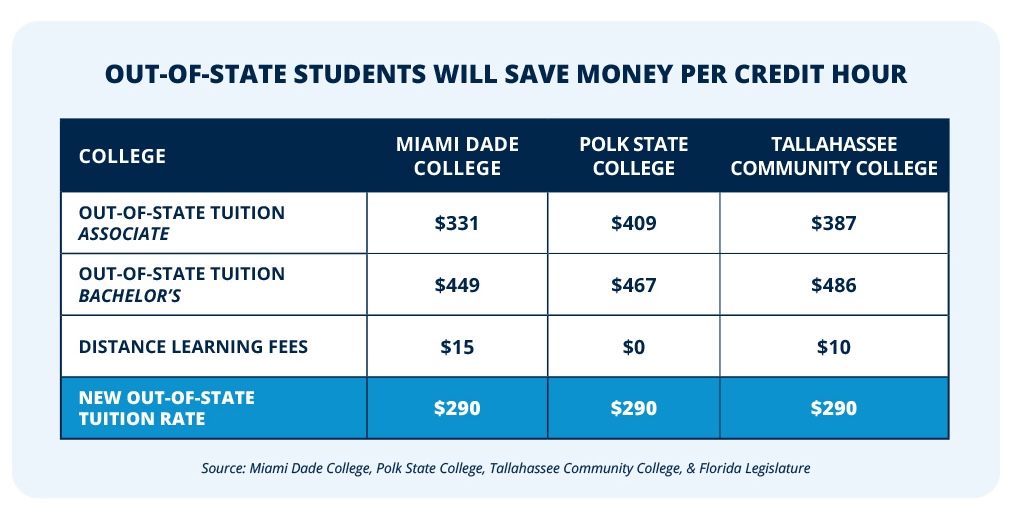
Students graduating from these Florida colleges have had starting salaries and rates of employment well above the national average.
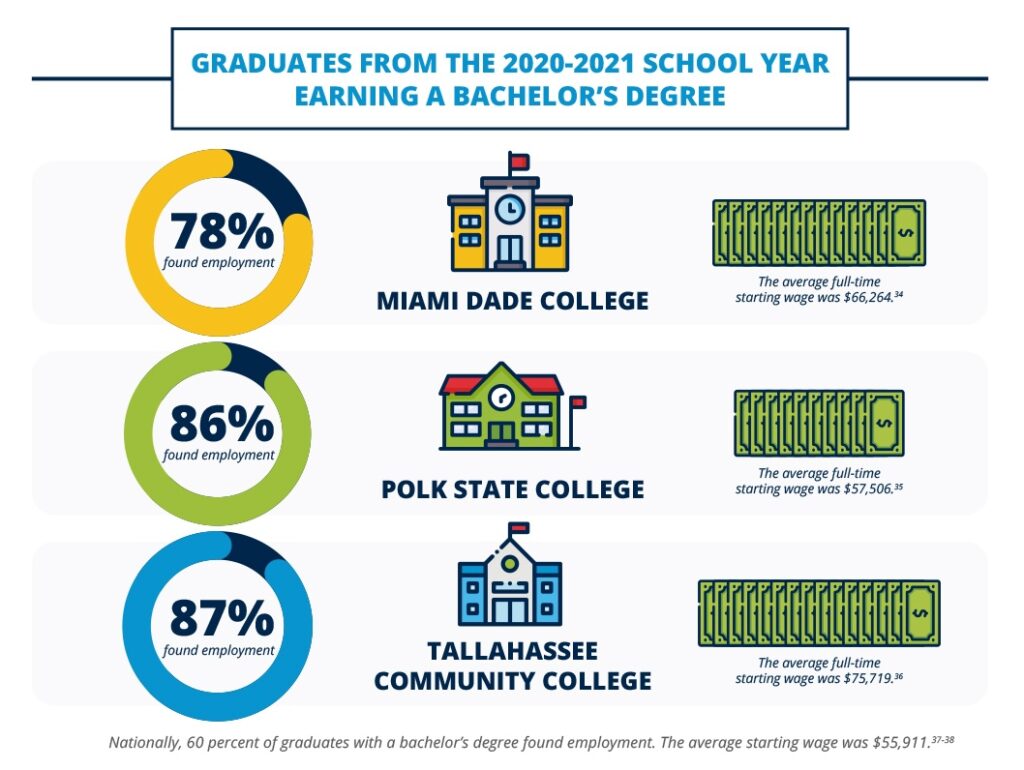
The three colleges offer a wide range of degree programs online.39-41 Students nationwide will look to Florida for career and educational options.
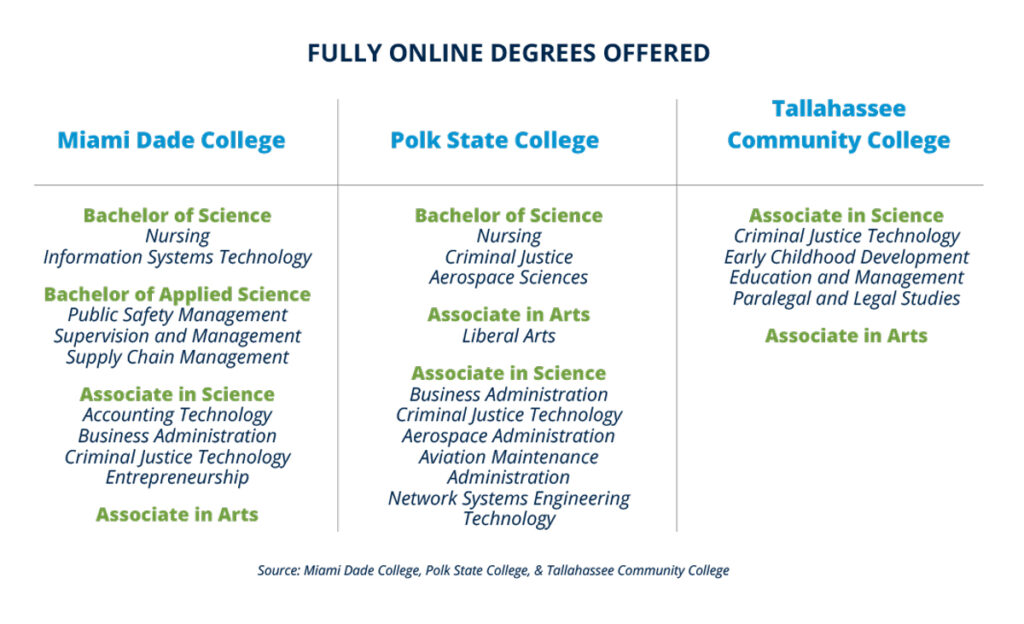
Demand for online education is increasing. In the fall of 2021, more than 60 percent of undergraduate students enrolled in at least one online course, up from 36 percent in 2019.42 And in 2021, 28 percent of undergraduate students—or 4.4 million students—took courses exclusively online, up from 15 percent in 2019.43
Florida is already home to one of the best online bachelor’s programs in the country.44 The state’s policy will only bolster Florida’s ability to serve students nationwide.
Florida will benefit as it reinforces its higher education legacy.
Miami Dade College, Polk State College, and Tallahassee State College will benefit as Florida’s policy may spark a broader, national conversation. Moreover, the new tuition rate could generate increased revenue for these first movers as students nationwide look to Florida for education and career options.
The reform further solidifies Florida as a leader and a disruptor. Confidence in higher education has plummeted.45 Just eight years ago, 57 percent of Americans expressed a “great deal” or “quite a lot” of confidence in these institutions, compared to only 36 percent today.46 It is time to break the cycle with affordable solutions, free from political indoctrination.

Amid the onslaught from the radical Left, now more than ever the nation needs excellent and affordable education options. American students crave traditional education that fosters open dialogue and human flourishing. That is antithetical to the Marxist victim-oppressor model offered by the Left.
And while President Biden promises to inflate the cost of education with “free” money, and punish those who are responsible savers, Florida offers innovative solutions that promote self-sufficiency.47
The Bottom Line: Florida’s innovative online tuition reform solidifies the Sunshine State as a national leader in higher education. With this affordable education, free from political indoctrination, students will look to Florida for education and career opportunities.
No state has gone further to ensure students receive an excellent education, free from radical leftist indoctrination. Amid the plague of leftist education policies, Florida’s innovative and refreshing online tuition rate could allow students nationwide to have access to excellent higher education at an affordable cost.
REFERENCES
1. The Florida Senate, “House Bill 1285,” The Florida Senate (2024), https://www.flsenate.gov/Session/Bill/2024/1285.
2. Ibid.
3. Ibid.
4. Liesel Crocker, “Why states should defund DEI,” Foundation for Government Accountability (2024), https://thefga.org/research/why-states-should-defund-dei/.
5. James Lindsay, “Decolonizing the curriculum,” National Association of Scholars (2020), https://www.nas.org/academic-questions/33/3/decolonizing-the-curriculum#:~:text=Decolonizing%20the%20curriculum%20is%20about,replacing%20them%20with%20other%20agendas.
6. The Florida Senate, “Senate Bill 266: Higher education,” The Florida Senate (2023), https://www.flsenate.gov/Session/Bill/2023/266.
7. Press Release, “Governor Ron DeSantis signs legislation to strengthen Florida’s position as national leader in higher education,” Florida Governor (2023), https://www.flgov.com/2023/05/15/governor-ron-desantis-signs-legislation-to-strengthen-floridas-position-as-national-leader-in-higher-education/.
8. The Florida Senate, “House Bill 931: Postsecondary educational institutions,” The Florida Senate (2023), https://www.flsenate.gov/Session/Bill/2023/931.
9. Florida Board of Governors, “Prohibited expenditures,” Florida Board of Governors (2024), https://www.flbog.edu/wp-content/uploads/2024/01/Regulation-9.016.pdf.
10. James Taranto, “The Harvard of the unwoke,” The Wall Street Journal (2024), https://www.wsj.com/articles/the-harvard-of-the-unwoke-university-of-florida-is-fixing-higher-education-13f22b77.
11. Liesel Crocker, “Why states should defund DEI,” Foundation for Government Accountability (2024), https://thefga.org/research/why-states-should-defund-dei/.
12. Ibid.
13. Florida Board of Governors, “Performance funding model overview,” Florida Board of Governors (2023), https://www.flbog.edu/wp-content/uploads/2023/01/Overview-Doc-Performance-Funding-10-Metric-Model-Condensed-Version-Jan-2023.pdf.
14. April Rubin, “ACT test scores fall to lowest levels in 32 years,” Axios (2023), https://www.axios.com/2023/10/11/act-test-scores-lowest-2023.
15. Florida Department of Education Press Office, “Florida is ranked as number one state for education by U.S. News & World Report,” Florida Department of Education (2023), https://www.fldoe.org/newsroom/latest-news/florida-is-ranked-as-number-one-state-for-education-by-u-s-news-world-report.stml.
16. Jennifer Ma and Matea Pander, “Trends in college pricing and student aid 2022,” College Board (2022), https://research.collegeboard.org/media/pdf/trends-in-college-pricing-student-aid-2022.pdf.
17. Sarah Wood, “How much student loan debt does the average college graduate have?,” U.S. News & World Report (2023), https://www.usnews.com/education/best-colleges/paying-for-college/articles/see-how-student-loan-borrowing-has-changed.
18. Jon Marcus, “Student debt ‘binds my life:’ Why more older Americans are drowning in loans than ever,” USA Today (2023), https://www.usatoday.com/story/news/education/2023/09/01/student-loan-repayment-fears-borrowers-60s-and-older/70725067007/.
19. Press Release, “Florida’s public universities have the lowest cost of earning a degree in the nation,” Florida Governor (2022), https://www.flgov.com/2022/11/03/floridas-public-universities-have-the-lowest-cost-of-earning-a-degree-in-the-nation/.
20. Florida Department of Education and the Florida College System, “College and textbook affordability in the Florida College System 2021,” Florida Department of Education (2021), https://www.fldoe.org/core/fileparse.php/7724/urlt/2021-FCS-College-and-Textbook-Affordability-Report.pdf.
21. Florida Board of Governors, “Average cost of a degree continues to decline for State University System of Florida students,” State University System of Florida (2022), https://www.flbog.edu/2022/03/30/average-cost-of-a-degree-continues-to-decline-for-state-university-system-of-florida-students/.
22. Florida Department of Education Press Office, “Florida is ranked as number one state for education by U.S. News & World Report,” Florida Department of Education (2023), https://www.fldoe.org/newsroom/latest-news/florida-is-ranked-as-number-one-state-for-education-by-u-s-news-world-report.stml.
23. Ibid.
24. The 2023 Florida Statutes, Title XLVIII, Chapter 1009, http://www.leg.state.fl.us/statutes/index.cfm?App_mode=Display_Statute&URL=1000-1099/1009/1009.html.
25. Miami Dade College, “Student financial services,” Miami Dade College (2023), https://www.mdc.edu/student-financial-services/tuition-fees/.
26. Florida Department of Education Press Office, “Florida is ranked as number one state for education by U.S. News & World Report,” Florida Department of Education (2023), https://www.fldoe.org/newsroom/latest-news/florida-is-ranked-as-number-one-state-for-education-by-u-s-news-world-report.stml.
27. The White House, “Fact sheet: President Biden cancels student debt for more than 150,000 student loan borrowers ahead of schedule,” The White House (2024), https://www.whitehouse.gov/briefing-room/statements-releases/2024/02/21/fact-sheet-president-biden-cancels-student-debt-for-more-than-150000-student-loan-borrowers-ahead-of-schedule/.
28. Florida Department of Education, “Higher education,” Florida Department of Education (2024), https://www.fldoe.org/schools/higher-ed/.
29. The Florida Senate, “House Bill 1285,” The Florida Senate (2024), https://www.flsenate.gov/Session/Bill/2024/1285.
30. Ibid.
31. Ibid.
32. Federal Student Aid, “2024-2025 Federal Pell Grant maximum and minimum award amounts,” U.S. Department of Education (2024), https://fsapartners.ed.gov/knowledge-center/library/dear-colleague-letters/2024-01-31/2024-2025-federal-pell-grant-maximum-and-minimum-award-amounts#:~:text=Although%20%247%2C395%20is%20the%20maximum,Award%20for%20an%20award%20year.
33. The Florida Senate, “House Bill 1285,” The Florida Senate (2024), https://www.flsenate.gov/Session/Bill/2024/1285.
34. Florida Education & Training Placement Information Program (FETPIP), “Florida College System 2020-21 Bachelor’s degree completers,” Florida Department of Education (2021), https://www.fldoe.org/core/fileparse.php/7592/urlt/FCS2021-Bach-CompSch.pdf.
35. Ibid.
36. Ibid.
37. Kevin Gray, “Final salaries jumped for class of 2022, Bachelor’s, Master’s graduates,” National Association of Colleges and Employers (2023), https://www.naceweb.org/job-market/compensation/final-salaries-jumped-for-class-of-2022-bachelor-s-master-s-graduates.
38. Kevin Gray and Andrea Koncz, “Class of 2022 employment rate matched pre-pandemic level,” National Association of Colleges and Employers (2023), https://www.naceweb.org/about-us/press/609722b6-4268-41af-b439-3ac9aa89d411#:~:text=NACE’s%20First%2DDestination%20Survey%20for,time%20employment%20rate%20was%2059.1%25.
39. Polk State College, “Online @ Polk State,” Polk State College (2024), https://www.polk.edu/online-polk-state/degrees/.
40. Tallahassee Community College, “Welcome to TCC online,” Tallahassee Community College (2024), https://www.tcc.fl.edu/academics/academic-divisions/tcc-online/.
41. Miami Dade College, “MDC online,” Miami Dade College (2024), https://www.mdc.edu/online/programs/default.aspx.
42. National Center for Education Statistics, “Distance learning,” National Center for Education Statistics (2023), https://nces.ed.gov/fastfacts/display.asp?id=80.
43. Ibid.
44. Sarah Wood, “See the 2024 U.S. News rankings for best online programs,” U.S. News & World Report (2024), https://www.usnews.com/education/online-education/articles/us-news-ranks-best-online-programs.
45. Megan Brenan, “Americans’ confidence in higher education down sharply,” Gallup (2023), https://news.gallup.com/poll/508352/americans-confidence-higher-education-down-sharply.aspx.
46. Ibid.
47. Alli Fick and Haley Holik, “How lawmakers can rein in regulations like the student loan bailout,” Foundation for Government Accountability (2023), https://thefga.org/research/lawmakers-can-rein-in-regulations-like-student-loan-bailout/.
